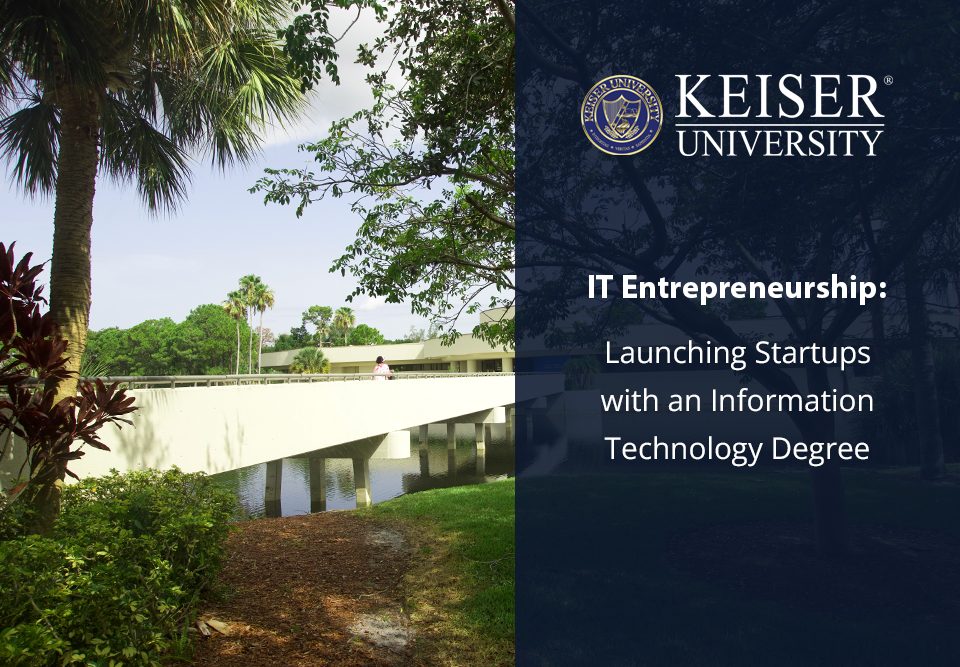Information technology represents one of today’s most innovative and impactful fields, offering numerous opportunities for ambitious, passion-driven changemakers. While many IT professionals find satisfaction in working for established employers in roles such as database administration or software development, others aspire to carve their own path as IT entrepreneurs. For innovative thinkers with big ideas and a desire to shape this dynamic industry, IT entrepreneurship is an exciting but challenging journey that requires more than technical knowledge alone.
An IT degree provides a well-rounded foundation, equipping students with technical skills, leadership abilities, and the soft skills essential for startup success. Through comprehensive coursework, hands-on learning experiences, and networking opportunities, an IT degree can offer powerful preparation for aspiring entrepreneurs.
This tech startup guide uncovers the secrets to building an IT company from the ground up, highlighting the advantages of pursuing an IT degree and exploring the steps for success in IT entrepreneurship.

Advantages of an IT Degree for Startups
An IT degree provides students with a well-rounded technical skill set, but the benefits extend beyond just technical knowledge. Additional advantages include leadership skill development, exposure to cutting-edge technologies, and a strong foundation for entrepreneurship. Key benefits include:
Technical Expertise for IT Entrepreneurship
The most successful tech entrepreneurs possess in-depth technical knowledge that allows them to identify opportunities and develop innovative products or services. With extensive technical skills, IT leaders can confidently market their offerings and ensure long-term product effectiveness. This expertise influences iterative design processes, encourages tech innovation, and strengthens product development.
An IT degree covers a broad spectrum of technical skills, from programming languages to systems analysis, cloud computing, and web development. Such a foundation enables future entrepreneurs to build solutions that meet real-world demands.
Understanding the Fundamentals of Software Development
While not all IT startups focus on software development, these skills are crucial for many entrepreneurs. Knowledge of software development helps founders articulate their vision, especially when core offerings involve mobile apps or Internet of Things (IoT) solutions. IT programs emphasize skills necessary for effective software development, including programming languages, DevOps practices, version control, and testing and debugging.
Problem-Solving Skills
Entrepreneurs often face unique challenges, and strong problem-solving skills help them find opportunities within these obstacles. IT programs cultivate these skills through immersive coursework, allowing students to apply their technical knowledge in realistic scenarios. This approach fosters resilience and equips future entrepreneurs with the creativity and adaptability needed for startup success.
Innovating Tech Solutions for Business Problems
IT programs adopt an interdisciplinary approach, encouraging students to integrate technical and business concepts. Hands-on learning experiences promote creative thinking within practical frameworks, allowing students to develop and test solutions for real business problems. Exposure to various tools and platforms inspires innovative thinking, helping future entrepreneurs address complex challenges in unique ways.
Access to Emerging Technologies
Tomorrow’s IT leaders need to be adaptable and eager to embrace new technologies as they emerge. IT degree programs provide insights into cutting-edge technologies, from AI and machine learning to blockchain and IoT. This exposure offers future entrepreneurs a competitive edge, encouraging them to adopt powerful tools and technologies that others may not yet realize are available.
Using Cutting-Edge Tools for Efficiency and Scalability
Efficient tools, often powered by artificial intelligence, streamline tasks and automate time-consuming processes. IT programs introduce students to these tools through case studies and immersive projects, helping aspiring entrepreneurs learn to leverage similar technologies as they enter the competitive business landscape.
A variety of tools promise to boost efficiency, often drawing on artificial intelligence and other advanced mechanisms to automate time-consuming tasks or processes. IT programs introduce students to these tools while also revealing top ways to utilize these through case studies and immersive class projects. Through these experiences, aspiring entrepreneurs gain the confidence needed to make the most of similar tools as they enter the competitive business landscape.
Knowledge and Skills That Complement IT Degrees
IT degrees develop a strong technical foundation, but they also encourage broader competencies that support entrepreneurial success. From soft skills to leadership capabilities, essential skills include:
Business Management Skills
Strategic planning and financial management are essential for IT entrepreneurship. Project management is another critical area, facilitating both innovation and efficiency. Project management courses teach crucial concepts like risk management and project scoping, helping entrepreneurs build resilient businesses.
Strategic Decision-Making and Planning
Tech entrepreneurs must be capable of developing and articulating their vision and mission, guiding everything from product development to marketing. Strategic planning skills, developed through coursework and projects, help entrepreneurs set objectives and make decisions that align with their goals.
Marketing and Sales for IT Startups
Marketing strategies help IT startups attract attention among target audiences and can also facilitate ongoing engagement with clients or customers. Market research, of course, is essential, given its important role within the startup’s business plan. IT entrepreneurs should also feel confident with navigating analytics, which reveal customer behavior and campaign performance.
Building Brand Awareness and Trust
Many IT entrepreneurs produce amazing ideas but struggle to attract attention from the clients or customers who most stand to benefit from their offerings. This issue can be overcome through marketing coursework, which reveals top strategies for developing brand awareness and boosting trust among both current and future customers.
Legal and Contractual Knowledge
Compliance represents a considerable challenge for ambitious IT entrepreneurs, who need to navigate a complex series of rules and regulations to avoid potentially significant repercussions. A basic overview of relevant legislation can prove invaluable, helping entrepreneurs avoid common mistakes or revealing when outside counsel might prove necessary. Many IT courses explore the ethical and compliance concerns inherent within the startup space while offering an introduction to important contracts such as founders’ agreements or service level agreements (SLAs).
Protecting Intellectual Property in the Tech Space
Intellectual property (IP) concerns abound in the competitive IT landscape, in which entrepreneurs often struggle to keep their unique ideas safe from competitors. Non-disclosure agreements and other IP contracts help safeguard innovations and clarify rights and responsibilities among founders or stakeholders, reducing the potential for disputes.
Types of IT Startups
Tech startups take many forms, often categorized based on the types of products or services they provide, or the sectors they serve. The following are among the most common types of IT startups:
Software Development Startups
Software development startups create innovative platforms and applications across various niches, from mobile apps to enterprise solutions. These startups often focus on specific industries, like healthcare or education, addressing specialized needs with user-friendly, purpose-driven products. This can be an excellent opportunity for entrepreneurial types with both technological expertise and experience in specific sectors.
No matter which niches they occupy, the most effective software development startups consistently provide user-friendly products both engaging and purpose-driven. By utilizing agile development strategies, these startups can gain a competitive edge that allows them to prototype quickly while drawing on the power of iterative design.
H3: Cybersecurity Startups
Cybersecurity startups provide tools and services to protect against cyber threats. They address security vulnerabilities, including compliance concerns, offering solutions like antivirus software, mobile device management, and cloud workload protection. Many startups also focus on compliance concerns, creating assessment tools and frameworks to help organizations abide by stringent regulations while also enhancing their cybersecurity protocols.
Cloud Computing and Infrastructure Startups
Cloud computing provides widescale access to digital resources, including servers, databases, software and more. The cloud has revolutionized the digital landscape, but opportunities for innovation remain abundant. Cloud computing startups provide access to digital resources, offering solutions like Software as a Service (SaaS) and Platform as a Service (PaaS). These flexible, scalable solutions reduce the need for on-premises hardware and offer businesses valuable tools for innovation.
AI and Machine Learning Startups
AI and machine learning startups leverage advanced technologies to drive innovation across sectors Many of today’s influential and exciting technologies incorporate AI and ML, and organizations are eager to make the most of tools or platforms that help with collecting and analyzing a wealth of data. These startups specialize in areas such as machine vision or natural language processing, often applying these technologies to challenges in industries like finance or healthcare.
Guide to Launching Your Tech Startup as an IT Graduate
Do you find the opportunities highlighted above compelling? The opportunities in IT entrepreneurship are compelling. Follow these steps to set your startup on the path to success:
Defining Your Startup Vision and Mission
Every successful startup is guided by a clearly defined vision and mission, which reveals what the startup intends to accomplish and how it can make a difference. These will later be incorporated in the business plan, and over time, should also provide powerful guidance to ensure that your startup makes an impact.
Identifying Market Needs
Many aspiring IT entrepreneurs are guided by extensive market research, with surveys, focus groups and even competitor analysis revealing which needs remain unmet within various markets, and whether proposed solutions would be well-received.
Building a Strong Business Plan
This should begin with an executive summary, highlighting the central business concept that underscores the startup along with key objectives and services or products that will help the startup achieve these goals. After highlighting vision and mission statements, the business plan should go on to detail market trends, along with insights into key competitors (including their strengths and weaknesses). Other elements of a tech startup business plan might include:
- Details about the organizational structure, including insights into management and necessary departments.
- A unique selling proposition (USP) explaining how products or services differ from those offered by competitors.
- A value proposition articulating how customers or clients will benefit from using key products or services.
- Financial projections, including insights into the startup’s revenue model and related funding requirements.
- An operational plan that highlights the development process, necessary facilities and vendor management.
Outlining Your Business Model
In addition to a comprehensive business plan, every IT entrepreneur should develop a detailed business model. This may share much in common with the business plan, but with a greater emphasis on the mechanics of the business. Components may include value propositions, revenue streams, segmentation details, and cost structures.
Funding and Financial Considerations
Strong funding sources will ensure that you can make good on your core vision without requiring too many compromises. Numerous funding opportunities are available, but you will need to understand how to navigate this process, and how to select funding solutions that best align with your unique goals and priorities.
Seeking Venture Capital or Angel Investors
Many tech startups make the most of venture capital (VC), which involves pooled funds from multiple investors, used to help early-stage businesses believed to hold strong growth potential. A significant equity stake may be required for the VC, but large investments can be expected. Angel investors may also be worth pursuing, relying on wealthy individuals (known as angels) to provide smaller investments while also maintaining a smaller equity stake.
Things to Consider Before Starting an IT Company
Starting an IT company can be exciting, but considerable challenges are to be expected. The steps outlined above are only the beginning; as your startup takes off, you will need to navigate numerous challenges, and many of these will be difficult to predict. Major concerns can be prevented or alleviated by adopting a proactive approach. Thorough research and planning are crucial, encompassing these essentials:
Market Research and Industry Analysis
Market research is a must, as even the most brilliant IT concepts or strategies may fall short if applied in the wrong setting or situation. We have identified several key components of market research above, but there are also many implications specific to the tech space. For instance, market research efforts may examine the potential rates of technological adoption among target audiences.
Understanding the Legal Landscape
A complex series of rules and regulations shape the modern IT legal landscape. IT startups must adhere closely to these requirements, otherwise they risk significant penalties and other repercussions. Data privacy legislation, in particular, is a priority and warrants in-depth coverage. Intellectual property and contract law should also be explored, as these can have significant implications for IT entrepreneurs.
Building the Right Team
The most successful IT entrepreneurs recognize the value of delegation and are willing to let skilled professionals take over key tasks and responsibilities. While outsourcing can sometimes prove helpful, IT leaders must also know how to recruit similarly passionate professionals and use them to form a cohesive and collaborative team.
Pursue Your Passion as an IT Entrepreneur
Offering multiple information technology programs that help the IT leaders of tomorrow develop high-level technical skills, we are committed to inspiring and guiding a new generation of IT changemakers. Many programs are available at the graduate level, offering a deep dive into complex concepts that can set future IT leaders up for success. Contact a graduate admissions counselor today to learn more about Keiser’s IT programs and discover how these opportunities can help you realize your IT entrepreneurship goals.






 The instructors at Keiser University impacted my life. They believed in my ability to become a great graphic designer, regardless of how I felt about my skills. KU helped to prepare me for the real world and got me to where I am today.
The instructors at Keiser University impacted my life. They believed in my ability to become a great graphic designer, regardless of how I felt about my skills. KU helped to prepare me for the real world and got me to where I am today.
